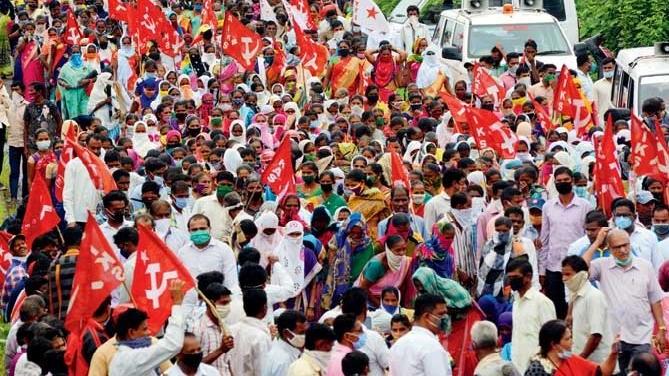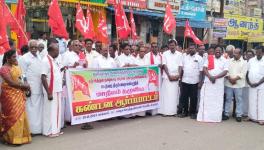Maharashtra: Sensing Farmers’ Anger, MVA to not Implement Farm Bills in State

Protest against Farm Bills in Maharashtra. | Image Courtesy: Mid-day
As was the case across most of the country, Maharashtra also witnessed a widespread agitation by farmers against the Farm Bills on Friday. Various farmers’ organisations, including the All India Kisan Sabha (AIKS), Swabhimani Shetkari Sanghatana (SSS) and others led the protest. North Maharashtra, Western Maharashtra and the regions of Marathwada and Vidarbha witnessed agitations in all districts. Sensing the anger and the firm opposition to the bills, the Maharashtra decided to score political points and declared that it would not implement them in the state.
“Farmers’ organisations are against the bills. The NCP too has opposed the bills. There was no need to pass these bills in such a hasty manner. We are not going to implement it in Maharashtra. We will also hold discussions with all stakeholders including experts, farmers, farmers’ leaders and those who support the bills,” deputy chief minister Ajit Pawar said in Pune on Friday.
Sources within the ruling Maha Vikas Aghadi are of the opinion that the stance of the ruling came about after it perceived a clear opposition by the state's farmers. A senior Shiv Sena minister conceded that there had been pressure by party workers from all three parties to oppose the bills. “The farmers are angry. APMCs agents, labourers and shareholders in various agriculture processing units are also against the bills. In such a case, no political party can afford to keep mum on the bills. It is expected that even CM (Uddhav) Thackeray may oppose it publicly looking at the ground reaction,” he said.
The protests on Friday attracted large crowds, with AIKS' Dr. Ajit Nawale claiming that almost 50,000 workers from the organisation were out on the roads in protest. “The nationwide protest was highly successful in Maharashtra. The agitation took place in 21 districts where more than 50 thousand farmers participated. This is just a start. If the Modi government doesn’t withdraw the bills, the state will see bigger agitations that this,” Nawale added.
With the MVA in opposition to the bills, many questions have surfaced. APMCs are under the state government's jurisdiction while the Minimum Support Price (MSP) is declared by the Centre. The Modi government has reiterated assurances that that it will protect the MSP but there is no such mention of it on paper. As a result, even if the Union Government declares MSPs, it is highly possibile that the rates will be lower than it.
Milind Murugkar, a policy researcher and an agro-economist, said that in this case the state government will have to be more vigilant on two fronts. “MSP is declared by the Centre so the financial provision for MSP is its duty. The state will have to see that it is getting enough money for the provision and if not, it will have to call out the Union Government,” he said. He added that the second challenge will be to sustain APMCs. “According to this Bill, traders will not have to pay tax to the state government if they don't go to the APMCs to buy. So, in a way, it would be existential crisis for APMCs and the state government will have to see that this regulatory body, which has helped farmers over the years, can sustain,” said Murugkar.
A senior official in the state’s marketing department also pointed out another issue. “Generally, wheat and rice MSPs in Punjab and Haryana are lesser because the production is higher and the production cost is lower. Maharashtra's production is lower but, on the other hand, the cost is higher. State do not decide MSPs. So, farmers from Maharashtra who grow wheat and rice always get a lesser price than the MSP. After these bills the situation will get more complex as those farmers who get only one rice crop a year would ultimately be forced to sell at whatever price they can get. There are a number of local varieties of rice which get a good price in the market. But with these bills, it is feared that the prices will go down and losses will be for the farmers to bear,” said the official.
Political analysts see the current agitation and the Maharashtra government's stand as essential given the times. “On one hand, the Modi government says that farmers are free. However, two days prior to these bills being passed in the Lok Sabha, the same government banned the export of onions. Why? It was because the domestic rates for onions were high. Hence, the difference between their walk and talk has damaged the Modi government’s reputation among farmers in Maharashtra. It is why the MVA’s stand is not just a reflection of the mood of farmers in the state, but also the right move ideologically and politically,” said senior journalist Srimant Mane from Nashik.
The challenge for farmers’ organisations going ahead is about sustaining their current momentum. Consolidating like-minded organisations is another task. “The Modi government has committed a major mistake by pushing the bills through the Rajya Sabha in this manner. This has triggered the emotion of betrayal among farmers’. How the current protest morphs into a mass movement of farmers across India remains to be seen. However, one thing is sure that no farmer in Maharashtra and India is under the illusion anymore that the Modi government wishes them well,” said senior Aurangabad-based journalist Jaydeo Dole.
Get the latest reports & analysis with people's perspective on Protests, movements & deep analytical videos, discussions of the current affairs in your Telegram app. Subscribe to NewsClick's Telegram channel & get Real-Time updates on stories, as they get published on our website.
























